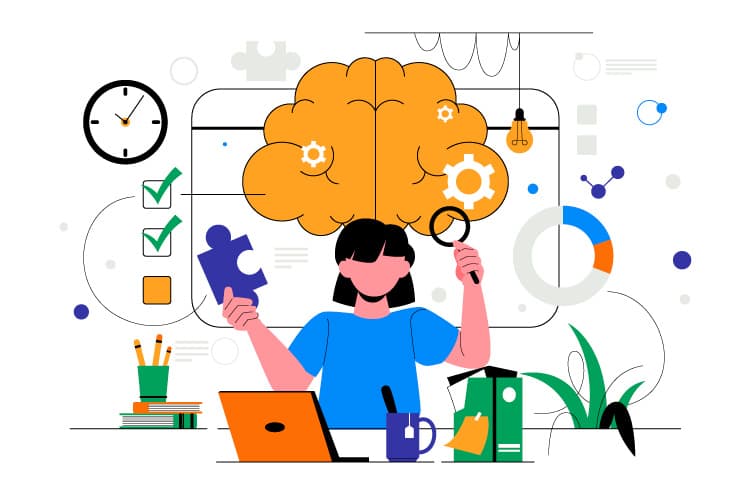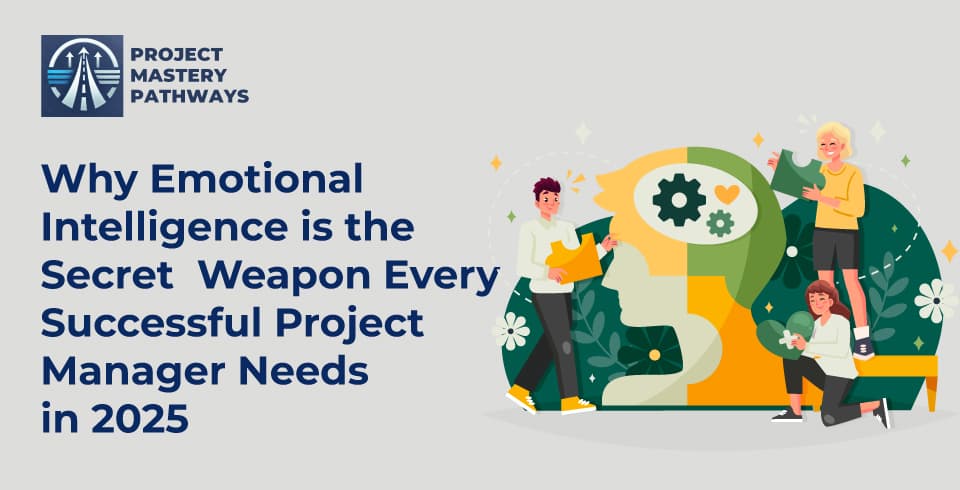You’ve mastered Gantt charts, perfected your risk registers, and can recite the PMBOK Guide in your sleep. But here’s a hard truth: technical skills alone won’t make you a great project manager. Picture this—your project is on schedule, within budget, but your team is disengaged, stakeholders are frustrated, and conflicts are brewing beneath the surface. Sound familiar?
The missing ingredient isn’t another certification or project management tool—it’s emotional intelligence (EQ). In today’s complex project environments, where hybrid teams, diverse stakeholders, and rapid change are the norm, your ability to understand and manage emotions can make or break project success. By the end of this blog, you’ll understand why EQ is no longer optional for project managers and how developing it can transform your leadership effectiveness and career trajectory.
Understanding Emotional Intelligence in Project Management Context
Emotional intelligence, often abbreviated as EQ or EI, refers to the ability to recognize, understand, and manage your own emotions while also being attuned to the emotions of others. For project managers, this translates into five core competencies that directly impact project outcomes.
Self-awareness means understanding your emotional triggers, strengths, and limitations. When a sponsor suddenly cuts your budget by 30%, a self-aware project manager recognizes their frustration but doesn’t let it cloud their judgment during the crisis response meeting.
Self-regulation is your ability to control impulsive reactions and maintain composure under pressure. Imagine discovering a critical deliverable will be delayed by two weeks. Instead of panicking or blaming the team, a project manager with strong self-regulation calmly assesses the situation, develops contingency plans, and communicates transparently with stakeholders.
Motivation in the EQ context goes beyond meeting deadlines—it’s about maintaining enthusiasm and resilience despite setbacks, and inspiring your team to do the same. Empathy allows you to genuinely understand team members’ perspectives, concerns, and aspirations, while social skills enable you to build relationships, influence without authority, and navigate organizational politics effectively.
Research consistently shows that project managers with high emotional intelligence deliver better project outcomes. According to the Project Management Institute’s Pulse of the Profession reports, organizations that prioritize emotional intelligence in their project leaders see significantly higher project success rates and team performance metrics.
How Emotional Intelligence Drives Team Performance and Collaboration
Your project team isn’t a collection of resources—they’re human beings with emotions, motivations, and personal challenges. Emotional intelligence helps you unlock their full potential.
Consider a scenario where two senior developers on your team have conflicting approaches to solving a technical problem. A project manager lacking EQ might simply impose a solution or ignore the tension, hoping it resolves itself. However, an emotionally intelligent project manager recognizes the underlying emotions—perhaps one developer feels their expertise is being questioned while the other feels unheard.
By demonstrating empathy, you create a safe space for both developers to express their concerns. Through active listening and acknowledging their perspectives, you help them find common ground. This approach, closely aligned with the principles of servant leadership, transforms conflict into collaboration and builds stronger team cohesion.
Emotional intelligence also enhances your ability to motivate diverse team members. You recognize that your millennial developer values work-life balance and professional growth, while your experienced business analyst prioritizes recognition and autonomy. By understanding these individual drivers, you can tailor your leadership approach, assign meaningful work, and create an environment where everyone thrives.
When team members feel understood and valued, they become more engaged, communicate more openly, and take ownership of their work. This psychological safety, fostered by emotionally intelligent leadership, becomes your project’s competitive advantage.
Mastering Stakeholder Management Through Emotional Intelligence
Stakeholder management is arguably where emotional intelligence matters most. Your stakeholders—from executives to end-users—each bring different expectations, communication preferences, and emotional responses to project developments.

Imagine presenting a status report to your steering committee. The CFO interrupts with sharp questions about budget variances, their tone suggesting frustration. An emotionally intelligent project manager doesn’t become defensive or match their intensity. Instead, you recognize the emotion behind the questions—perhaps concern about organizational financial pressures you’re unaware of.
By staying regulated and responding with empathy, you acknowledge their concerns, provide clear data-driven answers, and offer proactive solutions. This emotional attunement transforms a potentially adversarial interaction into a constructive dialogue, strengthening your credibility and the stakeholder relationship.
Emotional intelligence also enhances your political savvy. You can read the room during crucial meetings, sensing when to push forward with a proposal and when to step back. You notice the non-verbal cues—the executive who checks their phone repeatedly might be signaling disinterest, prompting you to adjust your approach mid-presentation.
Furthermore, when delivering difficult news—project delays, scope changes, or budget overruns—your EQ helps you choose the right timing, tone, and communication channel. You anticipate stakeholder reactions and prepare responses that address both the rational concerns and the emotional impact of your message.
Building Your Emotional Intelligence as a Project Manager
The encouraging news is that unlike IQ, emotional intelligence can be developed and strengthened throughout your career. Here are practical strategies to build your EQ:
Start with self-reflection. After challenging project situations, take time to analyze your emotional responses. What triggered stress or frustration? How did your emotions influence your decisions? Journaling or discussing situations with a mentor can provide valuable insights into your emotional patterns.
Practice active listening. In your next team meeting, focus entirely on understanding rather than formulating responses. Notice body language, tone of voice, and what’s not being said. Ask clarifying questions that demonstrate genuine interest in others’ perspectives.
Seek feedback regularly. Ask your team members, peers, and stakeholders how they perceive your leadership style. Questions like “How do you feel about the team environment I’m creating?” or “Do you feel heard when you raise concerns?” can reveal blind spots in your emotional intelligence.
Develop mindfulness practices. Even five minutes of daily meditation or breathing exercises can enhance your self-awareness and emotional regulation. These practices help you create space between stimulus and response—critical for maintaining composure during project crises.
Expand your empathy by deliberately learning about your team members’ backgrounds, work styles, and motivations. Schedule one-on-one conversations that go beyond project status updates. Understanding the person behind the role enhances your ability to lead effectively.
Consider investing in formal training or coaching focused on emotional intelligence development. Many successful project managers supplement their technical certifications with EQ assessments and development programs that provide structured growth pathways.
Your Path Forward: Combining Technical Excellence with Emotional Intelligence
As project management evolves in 2025 and beyond, the most successful project managers will be those who balance technical competency with exceptional emotional intelligence. Your ability to create psychological safety, navigate complex stakeholder dynamics, and inspire high-performing teams will differentiate you in an increasingly competitive field.
Whether you’re preparing for your PMP certification or already leading projects, developing your emotional intelligence should be a continuous priority. The frameworks, methodologies, and tools you learn are essential, but it’s your EQ that will enable you to apply them effectively in real-world scenarios with real people.
Remember, every project challenge is an opportunity to practice and strengthen your emotional intelligence. The difficult stakeholder conversation, the team conflict, the unexpected crisis—these aren’t just obstacles to overcome, but chances to develop the leadership capabilities that will define your career success.
Ready to accelerate your project management journey? Subscribe to my YouTube channel, PMPwithRay, for practical insights on developing both technical and soft skills that make exceptional project managers. For comprehensive training that covers emotional intelligence alongside essential PM competencies, explore my project management courses on Udemy, including the PMP Certification Exam 35 PDU Training and Project Management Basics for Project Managers, where you’ll gain the knowledge and confidence to lead with both expertise and empathy.

